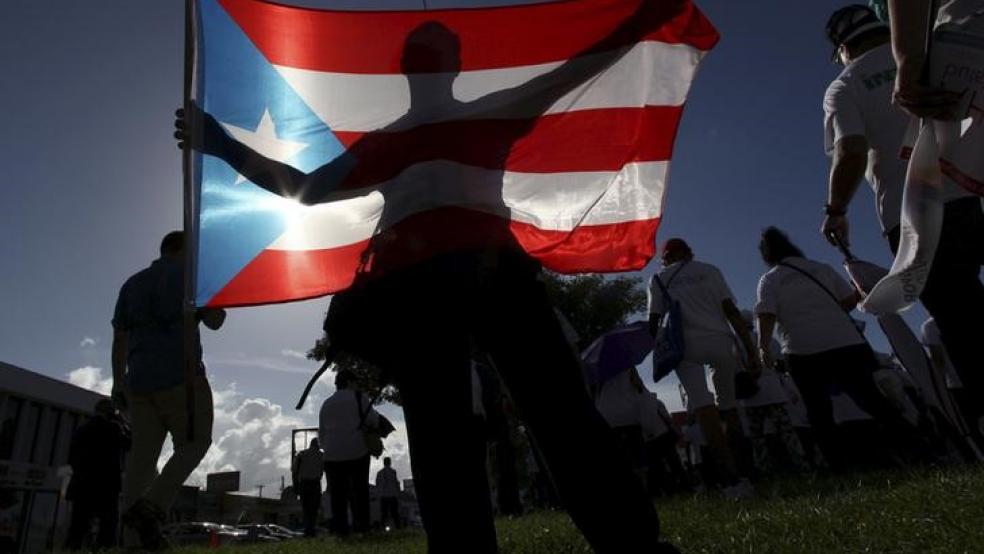Hedge funds are trying to halt a House bill that would create a mechanism for restructuring Puerto Rico’s massive $70 billion debt. Those funds may be in for a surprise: If they kill the measure and then rely on U.S. courts to enforce the terms of their bonds, judges may not cooperate. There is a history of unsuccessful bondholder lawsuits against defaulting U.S. governments that could provide a legal pretext for judicial inaction.
In theory, hedge funds can pursue a lucrative strategy of buying impaired bonds from less knowledgeable investors at deeply discounted prices and then taking aggressive legal action to collect all, or almost all, of the promised principal and interest. Unlike many small investors, hedge fund managers have the patience and legal sophistication needed to execute such a strategy.
Related: Everything You Need to Know About the Puerto Rico Debt Crisis
Earlier this year, famed fund manager Paul Singer showed how it’s done. After Argentina defaulted on its sovereign debt in 2002, most investors accepted a settlement worth 30 cents on the dollar. Singer refused to take the deal and instead litigated — at one point obtaining a court order mandating the seizure of an Argentine naval vessel. Earlier this year, a new Argentine government settled with Singer’s Elliott Management and fellow hedge funds Aurelius Capital Management, Davidson Kempner and Bracebridge Capital for roughly 75 cents on the dollar.
In Puerto Rico’s case, several funds appear to be applying this model. Because hedge funds are not required to report their bond holdings to the SEC (although they do have to report equity positions), we don’t know exactly who owns how much of which Puerto Rico bonds. But, by reviewing news accounts and court filings, the Center for Progressive Reporting has compiled a list of over 30 hedge funds that appear to own at least some Puerto Rico bonds. The list includes a couple of the firms that shared in the windfall from holding out and litigating against Argentina. In all, hedge funds own an estimated 36 percent of Puerto Rico’s outstanding bond obligations.
Currently, the House Natural Resources Committee is considering a bill to address Puerto Rico’s financial crisis. The legislation, called PROMESA, would create a federal oversight board to help Puerto Rico governments balance their budgets, improve financial reporting and facilitate debt restructuring when voluntary agreements between creditors and borrowers cannot be reached. This last provision is problematic for litigious hedge funds because it provides a mechanism under which debt restructuring terms — including delayed payments, interest reduction and even principal reduction — could be imposed on all bondholders, precluding the option to hold out for better terms.
Related: Puerto Rico’s Fiscal Crisis Has Been Brewing for 75 Years
The funds have responded by trying to derail the bill. In early April, broadcast media were blanketed with ads from the dark money Center for Individual Freedom urging viewers to call Congress and oppose the Puerto Rico “bailout.” (The term bailout seems misleading here because PROMESA does not provide federal funding to Puerto Rico. In fact, to the extent that a federally supervised restructuring reduces the size of bondholder settlements, it actually saves taxpayer money.)
But what if the hedge funds succeed either by preventing any legislation or by stripping a restructuring process from the bill? Can they expect the same results they achieved in the case of Argentina, in which a series of bondholder-friendly court verdicts ultimately forced the government to settle?
One clue may come from cases decided in the aftermath of U.S. state bond defaults. Although no state has defaulted on general obligation bonds in over 80 years, the 19th century witnessed numerous instances in which states – and the Florida territory – defaulted on their debts or even repudiated them outright.
Related: How Hedge Funds Are Profiting from Puerto Rico’s Pain
Most of the defaults occurred in two waves. The first followed the Panic of 1837, which triggered downturns in states that had invested in canals and railroads, or that had insolvent state-run banks (this latter problem is echoed by Puerto Rico, whose Government Development Bank is in deep trouble). The second wave occurred in Confederate states after the Civil War. In certain cases, unscrupulous politicians from the north took over southern state governments during Reconstruction, issued bonds and made off with the proceeds. When local control was restored, politicians and voters came to see the bonds as illegitimate and refused to service them.
During the 19th century, government bonds were often held by London-based investors. To address the many defaults in U.S. states and elsewhere around the world, Great Britain created the Corporation of Foreign Bondholders to represent the interests of these investors. The corporation produced annual reports, now available online from Stanford, which listed the defaulted bonds and described often-unsuccessful legal proceedings to enforce payment.
For example, Mississippi defaulted on state bank bonds in 1841. The corporation’s annual report details attempts to collect on the bonds 90 years later. In 1933, owners of the bonds transferred some of them to the Principality of Monaco. The following year, Monaco filed suit against the State of Mississippi in the U.S. Supreme Court, but the high court refused to hear Monaco’s claim on the grounds that the “Court has no jurisdiction of a suit brought by a foreign state against a state of the Union without her consent.”
Related: Puerto Rico Files to Sell Debt Ahead of Possible Default
By selling the bonds to Monaco, investors were trying to get around the 11th Amendment to the U.S. Constitution, which says, “The judicial power of the United States shall not be construed to extend to any suit in law or equity, commenced or prosecuted against one of the United States by citizens of another state, or by citizens or subjects of any foreign state.”
In older cases, the Supreme Court invoked the 11th Amendment when declining to aid bondholders. For example, in Hans v. Louisiana (1890), the high court ruled against a Louisiana resident bondholder on 11th Amendment grounds even though it did not specifically preclude suits by a state’s citizens. Due to the lack of subsequent litigation on state bond defaults, this and other old cases provide the most recent precedents.
Of course, Puerto Rico is a territory rather than a state, so one might assume it is exempt from the 11th Amendment. But, as of today, the only court ruling on the matter concluded that Puerto Rico should be treated like a state for 11th Amendment purposes. In a 1983 case, the U.S. Court of Appeals for the First Circuit stated: “Puerto Rico, despite the lack of formal statehood, enjoys the shelter of the Eleventh Amendment in all respects.” Since the decision was not appealed, the Supreme Court has never ruled on the question of whether territorial governments enjoy 11th Amendment protection.
Related: Could Puerto Rico Be Saved by Becoming the 51st State?
While this legal history does not necessarily mean that attorneys representing hedge funds can’t win in court, it suggests that victory is not assured. Mainland courts inclined to support Puerto Rico’s sovereignty have precedents that can be used as a basis for rulings in favor of the defense. Under the circumstances, hedge funds may wish to pare back their issue ad spending and let PROMESA advance.






